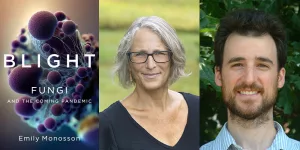The Write Connection at Thoreau Farm Presents Emily Monosson: Blight
 Author Emily Monosson in Conversation with Brent Ranalli
Author Emily Monosson in Conversation with Brent Ranalli
Sunday, March 10th at 2pm
FREE BOTH IN PERSON & VIRTUAL (ZOOM) REGISTRATION REQUIRED
Thoreau Farm 341 Virginia Rd. Concord, MA. 01742
Emily Monosson’s book Blight: Fungi and the Coming Pandemic is a prescient warning about the mysterious and deadly world of fungi—and how to avert further loss across species, including our own.
Delving into case studies at once fascinating, sobering, and hopeful, Blight serves as a wake-up call, a reminder of the delicate interconnectedness of the natural world, and a lesson in seeing life on our planet with renewed humility and awe.
Brent Ranalli has been engaged in Thoreau-related scholarship since 2009. He has written about Thoreau’s Native American interests, his virtue ethics and political philosophy, his walking gait, and the question of his participation in the Concord militia. His efforts were recognized with a Thoreau Society Research Fellowship in 2012. He has presented research findings in Concord and Acton, Massachusetts, in New York City, and in Gothenberg, Sweden. Brent serves as Editor of the quarterly Thoreau Society Bulletin.

The Thoreau Society received a Mass Humanities Staff Recovery Grant (2023-25) in support of our Membership and Program Coordinator. Funding from Mass Humanities has been provided through the Massachusetts Cultural Council.
